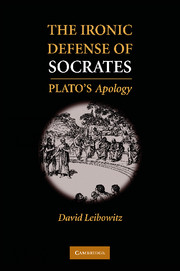Book contents
- Frontmatter
- Contents
- Acknowledgments
- Introduction
- 1 Title and Preliminary Considerations
- 2 Prooemium (17a1–18a6)
- 3 Prothesis (18a7–19a7)
- 4 Defense against the Charges of the First Accusers (19a8–24b2)
- 5 Defense against the Present Accusers (24b3–28b2)
- 6 Second Digression (28b3–34b5)
- 7 Epilogue (34b6–35d8)
- 8 Penalty Section (35e1–38b9)
- 9 Final Speech (38c1–42a5)
- 10 Conclusion
- Short Titles
- Bibliography
- Index
1 - Title and Preliminary Considerations
Published online by Cambridge University Press: 05 August 2011
- Frontmatter
- Contents
- Acknowledgments
- Introduction
- 1 Title and Preliminary Considerations
- 2 Prooemium (17a1–18a6)
- 3 Prothesis (18a7–19a7)
- 4 Defense against the Charges of the First Accusers (19a8–24b2)
- 5 Defense against the Present Accusers (24b3–28b2)
- 6 Second Digression (28b3–34b5)
- 7 Epilogue (34b6–35d8)
- 8 Penalty Section (35e1–38b9)
- 9 Final Speech (38c1–42a5)
- 10 Conclusion
- Short Titles
- Bibliography
- Index
Summary
The Importance and Puzzling Character of the Apology of Socrates
Thirty-five Platonic dialogues have come down to us as genuine. Socrates is present in at least thirty-three and the chief speaker in at least twenty-seven. Yet he is mentioned in a title only this once. Plato's Socrates first comes to sight, then, as a man with a defense, a man in trouble. Perhaps this is Plato's way of saying that, if we want to understand Socrates, we should begin by thinking about his conflict with Athens. If so, this conflict must be more than a stroke of bad luck that befell him (cf. Seventh Letter 325b5–c5); maybe it also provides the vantage point from which we can best understand the core of his life. At the very least, the title beckons the reader to begin his study of Socrates here. Another sign of the dialogue's importance is that it contains, not only Socrates' most extensive account of his life, but the only account in which he promises to tell the “whole truth” about his way of life (20c4–d6). For readers who come to Plato seeking clarity about the best way of life, or the virtuous life, what better place to begin could there be? What is more, in the chronological sequence of eight dialogues running from the Theaetetus to the Phaedo, the Apology takes the place of the promised but apparently unwritten dialogue on the philosopher (Sophist 216c–217c; Statesman 257a–258b, 311c). Perhaps the Apology is the missing Philosopher.
- Type
- Chapter
- Information
- The Ironic Defense of SocratesPlato's Apology, pp. 2 - 7Publisher: Cambridge University PressPrint publication year: 2010



